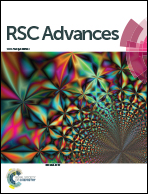Antimicrobial and osteogenic properties of iron-doped titanium†
Abstract
Iron (Fe) was doped into the surface of pure titanium by iron plasma immersion ion implantation (Fe PIII), so that a nano-thick surface layer, composed of abundant reactive sites and capable of producing reactive oxygen species (ROS), was produced on the material. In vitro results demonstrated that the Fe PIII treated titanium was able to inhibit bacterial adhesion (E. coli and P. aeruginosa), but facilitate the adhesion, proliferation, and osteogenic differentiation of MC3T3-E1 and/or rBMSCs. The antibacterial efficacy of Fe PIII groups is likely determined by both the intrinsic potential of the materials in ROS generation and the availability of electrons supplied by respiration electron transport chains (ETC) in bacterial cells, which is important to the cytocompatibility of the materials. This study revealed that doping of iron can modify the electrochemical behavior of titanium and regulate its potential on production of ROS, which controls the selective nature of biomaterials in toxicity.


 Please wait while we load your content...
Please wait while we load your content...